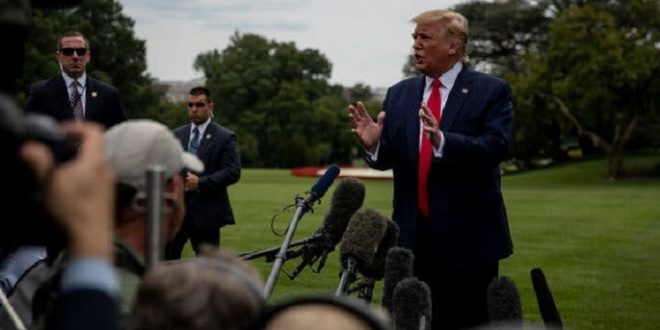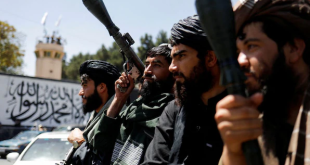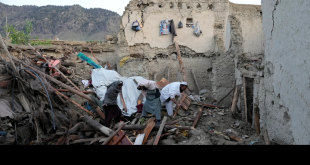WASHINGTON: President Trump declared on Monday that peace talks with the Taliban were “dead,” but signaled that he would still withdraw United States troops from America’s longest war, following the collapse this weekend of a monthslong effort to ease violence in Afghanistan.
Expressing impatience with the continued burden of keeping 14,000 troops in Afghanistan, the president said it was not the American military’s role to secure the world. “Our soldiers are incredible, but they are serving as policemen, to a large extent,” Mr. Trump said. “We would like to get out, but we will get out at the right time.”
A plan to send home as many as 5,400 American forces by early next year — just as Mr. Trump revs up his re-election campaign — was at the heart of the negotiations that also sought to secure a cease-fire in Kabul. The Afghan capital has been rocked by bloody attacks over the last several weeks, and violence is expected to escalate amid the political uncertainty.
Mr. Trump has long promised to end American involvement in the war, and said on Monday that the Afghan government “will have to take responsibility” for its own security “at the earliest possible time.”
Even so, the peace negotiations with the Taliban that would have started an American withdrawal “are dead,” Mr. Trump told reporters at the White House. “As far as I’m concerned, they are dead.”
It was unclear whether Mr. Trump’s angry denunciation would mean a permanent end to the talks with the Taliban, which had excluded Afghan government officials. The president has demonstrated a willingness to swing from one extreme to the other in the conduct of foreign policy, including condemning and then praising Kim Jong-un, the leader of North Korea.
American forces invaded Afghanistan nearly 18 years ago, to hunt for Osama bin Laden and Al Qaeda fighters weeks after the terror attacks of Sept. 11, 2001. At the time, the Taliban ruled Afghanistan under harsh laws; the extremist organization also offered safe haven to Al Qaeda.
Mr. Trump now faces a difficult choice: He can go ahead without a negotiated agreement and reduce the number of American forces in Afghanistan from the current 14,000 to about 8,600 — the bare minimum the Pentagon has said is necessary to maintain enough of an intelligence-gathering presence to detect threats to the United States.
But he then risks forfeiting negotiating power in future talks with the Taliban by withdrawing troops without first securing concessions for peace.
“The Taliban are perfectly happy to sit down and talk to us about the terms in which we’ll get out of Afghanistan,” said James B. Cunningham, who was the Obama administration’s deputy ambassador, and then top envoy to Afghanistan, from 2012 to 2014. “And they thought that’s what they had achieved. But there is no sign that means they are interested in anything else than, basically, imposing their will on Afghans.”
The lead American negotiator to the now-scuttled negotiations, Zalmay Khalilzad, was headed back to the United States this week to hash out a way forward with Mr. Trump’s national security team. Any new overtures to the Taliban, if they ever happen, are not expected for months at least.
Jonathan Hoffman, a Pentagon spokesman, would not comment when asked Monday whether the roughly 5,400 American troops would still leave Afghanistan in coming months, regardless of peace negotiations.
Afghan officials had agreed to the proposal to reduce the number of American troops to 8,600, given that the plans had been widely discussed and assurances were given that the withdrawal would be coordinated with other efforts to ensure security.
That would have brought the number of troops in Afghanistan roughly back to what it was when President Barack Obama left office — but also to a level that Mr. Cunningham said was “not sufficient to do everything that needed to be done two years ago.”
Afghan officials believe the Taliban have been emboldened by the talks — and will ramp up attacks ahead of national elections the government is determined to hold on Sept. 28. The Taliban had pushed American negotiators to delay the voting to prevent President Ashraf Ghani from winning an another five-year term and precluding a power-sharing government, as was expected to be negotiated in future talks.
“The Taliban are continuing massive violence against Afghans, against forces and civilians,” Ambassador Roya Rahmani, the Afghan envoy to the United States, said in an interview on Monday. “These are not just numbers — they are real people, they are families. And the impacts of these killings will remain an impact on generations. This is not a way forward for peace.”
She said the elections would go forward, “because that is a way toward stability and continuity and peace.”
In the meantime, however, the Trump administration is stepping up its own attacks on the Taliban.
On Sunday, Secretary of State Mike Pompeo said American forces in Afghanistan had killed over 1,000 members of the Taliban over the last 10 days. In a tweet, Mr. Trump said that “over the last four days, we have been hitting our Enemy harder than at any time in the last ten years!”
Mr. Trump offered no statistics to back up his statement, or whether he was referring to ground combat or attacks from the air. American troop levels in Afghanistan hit a wartime high in 2011, with more than 100,000 forces fighting daily against the Taliban.
But late last week, a suicide car bomb in Kabul killed an American soldier and 11 others; the attack infuriated Mr. Trump, who said he then called off a meeting with Taliban and Afghan leaders at Camp David.
In his comments to reporters on Monday, Mr. Trump also defended the idea of finalizing a peace agreement at Camp David, saying the famous presidential retreat had been used before to host people who “would not have been considered politically correct.”
The Taliban have long demanded that all foreign troops must leave Afghanistan. This weekend, Iran joined in that call. For Mr. Trump to accede now, his aides fear, would be a sign of weakness.
A significant troop reduction could fracture the president’s political support, with establishment Republicans warning that withdrawing troops risks Afghanistan’s fragile security and conservatives and other loyalists expecting Mr. Trump to end the war, as promised.
Withdrawing 5,400 troops now is not likely to give Mr. Trump any political edge in that debate, said Laurel Miller, a former top State Department official who worked on Afghanistan and Pakistan diplomacy for both Mr. Trump and Mr. Obama.
“He won’t be able to say I ended the war, he won’t be able to say I withdrew the troops,” Ms. Miller said. “The only thing he could say is, ‘I got back to the place I started before the generals told me I need to increase more troops.’”
The Trump administration got the Taliban to the negotiating table, Mr. Cunningham said, in part by erasing a timeline for withdrawing troops, and instead basing it on security conditions. The president’s national security team also sought Pakistan’s assurances that it would not give safe haven to the Afghan Taliban.
Those goals are now in doubt, and most likely will not be achieved through even a partial a military withdrawal, he said.
“Wouldn’t everyone like to end the longest war in U.S. history? I sure would, and I voted to start it,” said Jane Harman, the former top Democrat on the House Intelligence Committee and now president of the Wilson Center, a policy research institution. “But I think the way you end it is with a clear-eyes assessment of our obligations and interests.”
Michael D. Shear, Eric Schmitt, David E. Sanger and Thomas Gibbons-Neff contributed reporting from Washington.
 Afghanistan Times
Afghanistan Times




